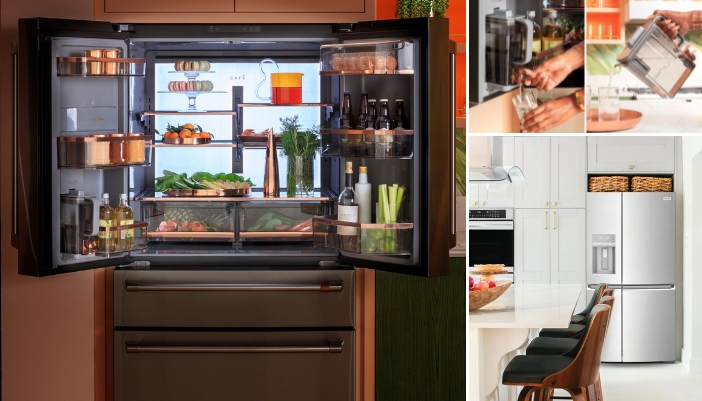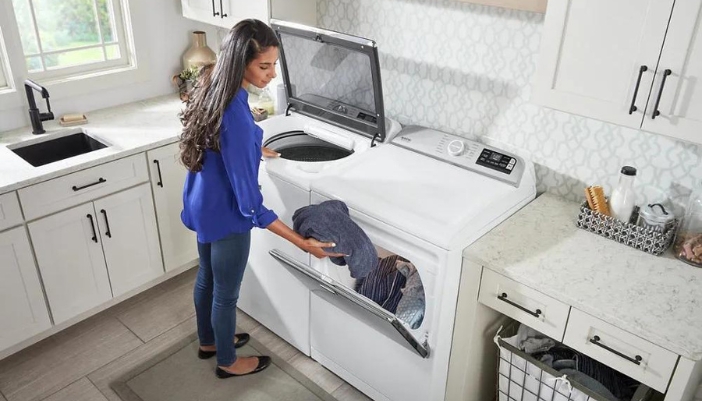If you’re looking for ways to make your home more energy efficient this year, start by evaluating your existing home appliances to determine which ones consume the most energy. Older appliances tend to use more energy than new appliances, so you can potentially reduce your utility bills, minimize your carbon footprint, and ease the strain on your local power grid just by replacing your outdated appliances with newer energy-efficient models.
Follow the ENERGY STAR®
To quickly identify energy-efficient appliances at your locally owned appliance store, look for appliances featuring the distinctive blue and white ENERGY STAR label. Appliances that have earned the ENERGY STAR certification are more efficient than conventional models, so you can save yourself quite a bit of time and energy by prioritizing ENERGY STAR-certified appliances.
Replace Appliances that Consume More Energy First
Refrigerators

Since your refrigerator uses more energy than any other small appliance in your home, it’s the best place to start on your quest toward an energy-efficient home. New refrigerators use innovative technology to maximize energy efficiency, and many top-rated models feature user-friendly layouts that are designed to minimize energy loss. Consumers tend to love the sleek look and practical functionality of French Doors, so it’s no surprise that these French Door refrigerators are two of our most popular energy-efficient models:
- Café™ 28.7 Cu. Ft. Platinum Glass French Door Refrigerator
- Wi-Fi connection and SmartHQ™ app can connect to your local utilities or Energy Management System to modify energy consumption and schedule high-energy operations during off-peak times (check with your utility company to ensure compatibility)
- Door alarms provide alerts if any door isn’t sealed, so you can address the issue to prevent cold air leakage and energy loss
- Enhanced LED lighting on the refrigerator’s back wall makes it easy to find what you’re looking for at a glance
- Three levels of sliding freezer storage provide ideal storage space for frozen pizzas, pies, and other large items while allowing plenty of space for other freezer staples
- Frigidaire Gallery® 21.5 Cu. Ft. French Door Refrigerator
- OpenAccess™ Door means you can access 75% of your refrigerator’s contents through just one door, which minimizes cold air loss from multiple open doors
- Freeze Boost option enhances energy efficiency and maintains the target temperature when new items are added to the freezer
- Auto-close doors use sensors to detect and close any door that is left open 5” or less to prevent cold air loss and spoiled food
- SpaceWise® Organization System makes it easy to store and find food
Clothes Dryers

Your clothes dryer doesn’t consume quite as much energy as your refrigerator, but it earns a close second place, especially if you tend to dry multiple loads of laundry each day. The most efficient dryers use sensors to optimize energy consumption, along with smart features that provide valuable alerts and notifications:
- GE® 7.8 Cu. Ft. Sapphire Blue Smart Front Load Electric Dryer
- Eco Dry option reduces energy consumption to dry your clothes efficiently
- Sensors and dual thermistor technology prevent wasteful over-drying, which consumes excess energy and can damage clothes
- Smart features provide alerts, such as the Check Vent alert, to improve energy efficiency and optimize drying times
- Maytag® 7.4 Cu. Ft. White Front Load Electric Dryer
- Internal sensors monitor moisture levels to achieve optimal efficiency
- Smart capabilities and Wi-Fi connection provide notifications and reminders that may help improve efficiency
Since your refrigerator and dryer consume more energy than any other small appliance in your home, consider upgrading these appliances first if you’re hoping to improve your home’s efficiency. To learn more about the best energy-efficient appliances for your home, pop into your local appliance store today.